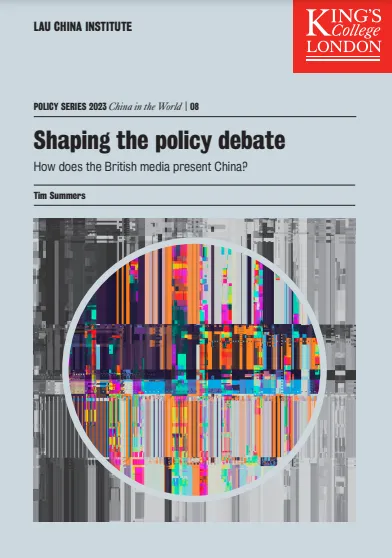Negative media coverage of China reinforces and contributes to widespread negative views about China in the UK. This makes a hawkish or more critical policy towards China more likely, in line with the interests of lobbyists and politicians inside and outside government who favour that approach.
Dr Tim Summers
11 January 2024
Shaping the policy debate: How the British media presents China
New report analyses coverage of China in the British media and the implications of a consistently negative framing for UK policymaking

The Lau China Institute together with the Chinese University of Hong Kong (CUHK) have launched a new joint report highlighting the implications of consistently negative coverage of China in British media.
The report, by Dr Tim Summers, Associate Professor at CUHK and Affiliate of the Lau China Institute, is based on an analysis of more than a thousand articles published in British media outlets - The Telegraph, The Guardian, the BBC, Financial Times and The Economist - between 2020 and 2023.
While negative reporting of China in the last few years is not a new phenomenon, the analysis provides systematic evidence that negative framing and tone have strongly dominated coverage of China in recent years. Given the relationship between media coverage of China and public opinion, political views and government policy, this has important implications for Britain’s policies towards China.
The author found that of the 576 reports on China published by The Telegraph between January and July 2021, 62% were ‘negative’ in tone, with just 2.5% positive, and the remainder classified as neutral in tone. The research found that in the first quarter of 2023, the tone of articles on China published by The Guardian was also predominately negative. Around two-thirds of articles about China across the media outlets studied were found to be negative.
… it is fair to conclude from this data that a clear majority of the articles about China across different media outlets adopt a negative tone or frame China negatively for British readers. That majority is of the order of magnitude of two-thirds, probably higher rather than lower. Further, very few articles frame China positively.
Dr Tim Summers
Dr Summers argues that this level of negative coverage poses significant implications:
“If media coverage is predominately negative, public opinion is bound to sway the same way. This, in turn, makes it more likely that the UK will adopt a more critical policy toward China, and may lead to missed opportunities with the country. British policy makers should consider the entire picture when considering Britain’s policies towards China, not only media coverage and public opinion.”
Read the full report.
The views expressed in the report reflect those of the author(s) and are not necessarily those of King's College London.

